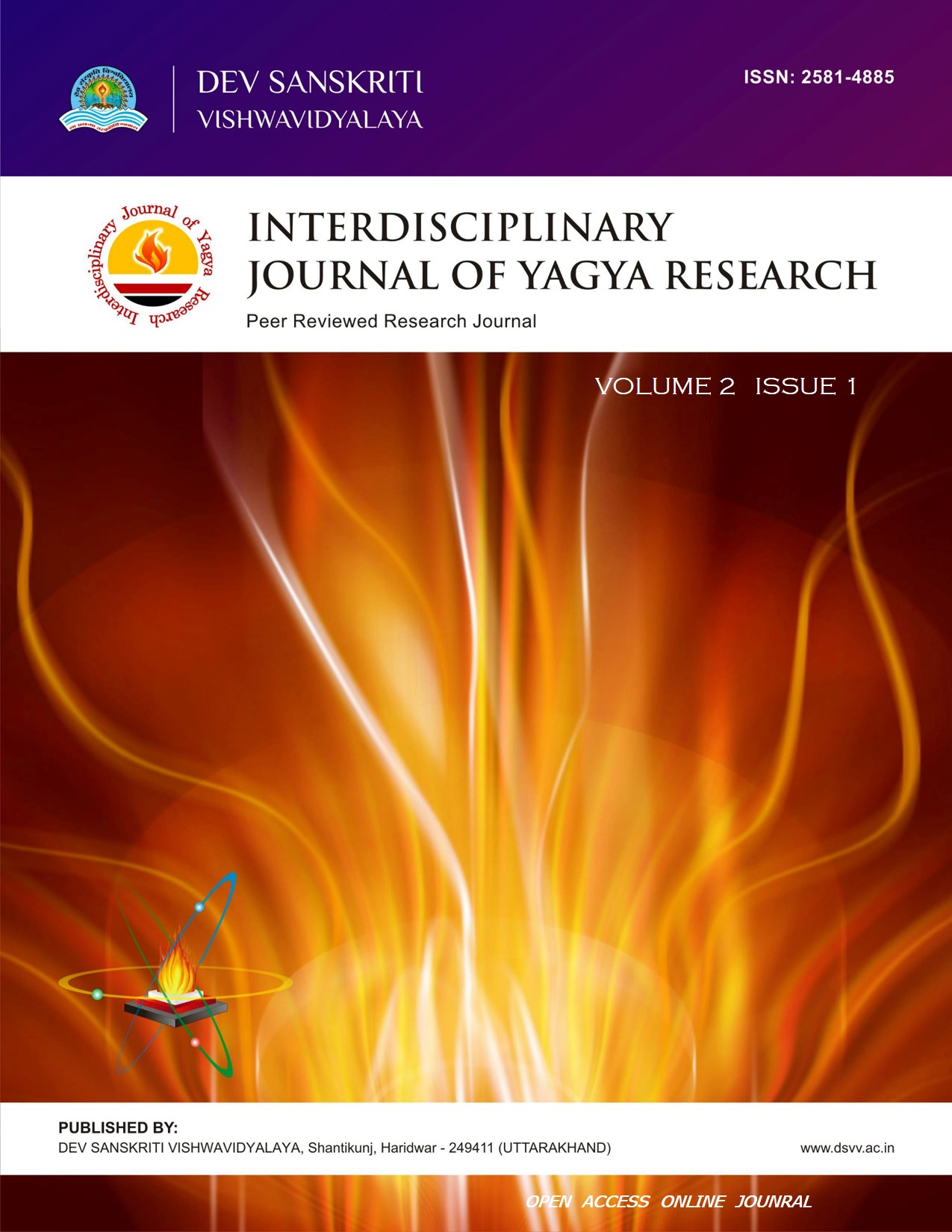Abstract
Yagya is the pillar of Vedic culture. It is an integral part of our sacred customs. Yagya is mostly considered as a ceremony incurring several steps. It is merely physical aspect of yagya in which after initial rituals and mantra chanting herbs are offered to fire as sacrifice. The physical process in itself is beneficial in several aspects for individuals, environment, nature etc. However the significance of yagya is not restricted to this sacrificial fire-process. It has much wider philosophy and deeper meaning. Ancient scripts emphasize more onto lessons associated with it for life and gives an insight towards the yagyaiya life style associated with it. The phrase ‘Idam-na-mama’ meant ‘This is not mine’. ‘Idam-na-mama’ signifies the central theme of Yagya. Life lived in accordance with the lessons from yagya experience holistic and cohesive development, many modern research findings have evidenced these phenomena.
Keywords: Yagya, Yagyaiya Life Style, Idam-na-mama
References
Pandya P. Reviving the Vedic Culture of Yagya. 2nd ed. Shantikunj, Haridwar, India: Shri Vedmata Gayatri Trust,; 2009.
Sharma S. Form and Spirit of Vedic Ritual Worship: Procedure of Yagya. Revised. Mathura, India: Yug Nirman Yojana Vistar Trust, Gayatri Tapobhumi; 2011. Available from: http://literature.awgp.org/book/procedure_of_gayatri_yagya/v1
Sharma S. Yug Yagya Paddhti. Revision. Shantikunj, Haridwar, India: Shri Vedmata Gayatri Trust; 2018.
Brahmavarchas, editor. Yagya ka gyan vigyan (Pt. Shriram Sharma Acharya Vangmay 25). Akhand Jyoti Sansthan, Mathura - 281003; 1994. 1.1-10.14. Available from: www.literature.awgp.org
Brahmavarchas. “Yagya” vishwa ka sarvotkrishtha darshan. In Brahmavarchas, editor. Pt Shriram Sharma Acharya Vangmay 25: Yagya Ka Gyan Vigyan. 2nd ed. Akhand Jyoti Sansthan, Mathura - 281003; 1998. p. 2.28-2.35.
Joshi R, editor. The integrated Science of Yagya. 1st ed. Yug nirman yojana vistar trust, Gayatri Tapobhumi, Mathura; 2001. Available from: http://literature.awgp.org/var/node/1442/The_Integrated_Science_of_Yagna.pdf
Park HJ, Kim BJ, Jeong H-C. Role of generosity and forgiveness: Return to a cooperative society. Phys Rev E. 2017;95(4):042314. https://doi.org/10.1103/PhysRevE.95.042314
Park SQ, Kahnt T, Dogan A, Strang S, Fehr E, Tobler PN. A neural link between generosity and happiness. Nat Commun. 2017;8:15964. https://doi.org/10.1038/ncomms15964
Aknin LB, Broesch T, Hamlin JK, Van de Vondervoort JW. Prosocial behavior leads to happiness in a small-scale rural society. J Exp Psychol Gen. 2015;144(4):788–95. https://doi.org/10.1037/xge0000082
Wärnå-Furu C, Sääksjärvi M, Santavirta N. Measuring virtues - development of a scale to measure employee virtues and their influence on health. Scand J Caring Sci [Internet]. 2010;24:38–45. https://doi.org/10.1111/j.1471-6712.2010.00799.x
Paulus M, Moore C. Preschoolers’ generosity increases with understanding of the affective benefits of sharing. Dev Sci. 2017;20(3):e12417. https://doi.org/10.1111/desc.12417

This work is licensed under a Creative Commons Attribution 4.0 International License.

